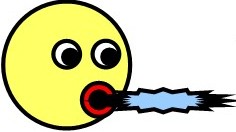This may end up being a multi-part post over the next few days.
The other day, I was watching an old movie from 1936, Theodora Goes Wild. It was a comedy about a romance novelist from a small New England town who meets the illustrator of her novel in Manhattan, and he then tracks her back to her hometown. She writes her racy novels under a nom de plume, so the bluenoses in her town have no idea that she is a novelist. Naturally, they are scandalized when this strange man shows up to see her. Outrageously improper! The whole movie doesn't make sense from the modern perspective of a society where women are liberated and no longer are under the thumb of their maiden aunts. Later, it turns out that the illustrator is stuck in a loveless marriage, but has promised his father, a New York politician, that he won't get divorced while his father is in office. Today, of course, we think nothing of the fact that famous politicians themselves have been divorced, and even less about divorce among their family members. This shows how much our society has changed in seventy years.
After the movie ended, there was a short feature that filled the rest of the time slot until the next hour. It seemed to be from about the same time period, and among the characters was a man with a toothbrush mustache who spoke with a thick German accent. He wasn't meant to be Hitler, just your garden-variety German in America in the mid-1930s. Still, when I looked at him I asked myself, "How long will it be until a man can wear a mustache like that and not be thought to be a neo-Nazi or worse?" Different varieties of beards, mustaches and sideburns go in and out of fashion over time, but the Hitler mustache has become permanently verboten. I don't see that changing any time soon, certainly not within the lifetime of anyone who actually remembers Hitler.
So what do these things have to do with each other? It comes down to cultural touchstones, those things that help us define who we are and are not, and more importantly, which people fall into the group defined in the word "we." In my case, "we" means English-speaking American, early 21st Century. Cultural commonalities define the people with which we identify, and the fewer things we have in common with others in our culture, the less we identify with them.
You'll know very quickly when you fall in with a group of people who don't share your cultural touchstones. It's a very alien experience. It may happen when you travel abroad to a country whose inhabitants speak a different language. This happened to me while I was in Germany. I'd go to the beer halls in Munich during the Oktoberfest, and while all the people there knew the words to all of the drinking folk songs, I didn't. (This doesn't include "Ein Prosit, ein Prosit," whose lyrics were simple enough that I could follow along.) Another example would be going to a church of a different denomination, for a wedding or a funeral. You quickly find that no matter what you are used to, they do it differently. Hand motions, genuflecting, rituals and liturgies you don't know. They have different touchstones.
And, as the old movies show, cultural touchstones are specific to a particular time just as much as they are to a language or a religion or a nationality. The American society of today has different popular cultural references than the American society of the 1930s or the 1960s, and unless you are a member of the generation that was actually around at a particular time, you cannot fully understand the cultural touchstones from that time.
By cultural references, I mean the various media and the other experiences and historical events that shaped the society and made them who they were: Music, theater, film, radio, television and the Internet have promulgated information and cultural memes. And of course, each generation has certain events that everyone knows about and was affected by. For people who are senior citizens today, it might be the Great Depression or Pearl Harbor; for middle-aged people, it might be the assassination of John F. Kennedy or the first Moon landing in 1969; for young people, it would probably be 9/11.
If, however, you were not around or were too young to remember a particular event, it's not a touchstone for you. I don't remember the Kennedy assassination; I was too young when it happened. I do, however remember the Moon landing.
When I was a kid, my parents had a book titled Bennett Cerf's Book of Laughs (1959). It was filled with many jokes and puns. Many of them, however, were so topical to the time period in which they were written that someone reading them across a gulf of time might have a hard time finding the humor in them. Often, the pun would reference a person or a song title, etc., that would be instantly familiar to anyone at the time, but today would most likely be greeted by shrugged shoulders and puzzled looks.
More on this tomorrow.

